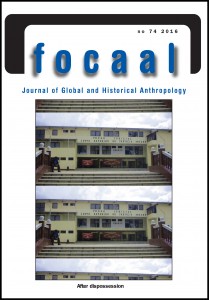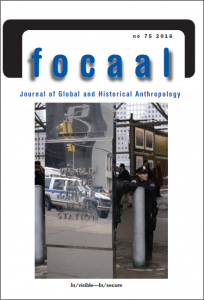 We are pleased to announce that the latest issue of Focaal – Journal of Global and Historical Anthropology has recently published and is available online at its new home, www.berghahnjournals.com/focaal.
We are pleased to announce that the latest issue of Focaal – Journal of Global and Historical Anthropology has recently published and is available online at its new home, www.berghahnjournals.com/focaal.
This issue’s theme section, titled “After dispossession” and guest edited by Oscar Salemink and Mattias Borg Rasmussen, addresses how seemingly global processes become entangled in local affairs in sub-Saharan Africa, a former Soviet republic, and Latin America. The editors’ introduction is available to all readers for free, and “Reclaiming the lake” is also temporarily free as a part of Berghahn’s Earth Day virtual issue.
Focaal 74 also includes a regular articles section and a forum piece by FocaalBlog’s very own Edward Simpson. As always, forums are freely available to all readers.
Volume 2016, Issue 74: After Dispossession
Guest Editors: Oscar Salemink and Mattias Borg Rasmussen
THEME SECTION
After dispossession: Ethnographic approaches to neoliberalization
Oscar Salemink and Mattias Borg Rasmussen
Reclaiming the lake: Citizenship and environment-as-common-property in highland Peru
Mattias Borg Rasmussen
Infrastructures of progress and dispossession: Collective responses to shrinking water access among farmers in Arequipa, Peru
Astrid Oberborbeck Andersen
Enemies of the people: Theorizing dispossession and mirroring conspiracy in the Republic of Georgia
Katrine Bendtsen Gotfredsen
Foregrounding possibilities and backgrounding exploitation in transnational medical research projects in Lusaka, Zambia
Birgitte Bruun
ARTICLES
“Communists” on the shop floor: Anticommunism, crisis, and transformation of labor in Bulgaria
Dimitra Kofti
Humanitarian mine action in Burma/Myanmar and the reterritorialization of risk
Ken MacLean
It was horrible, but we live now: The experience of young German adults in everyday encounters with the Holocaust
Lisa J. Krieg
FORUM
Is anthropology legal? Earthquakes, blitzkrieg, and ethical futures
Edward Simpson
Recommend Focaal to your library
As a key researcher in your field, you can recommend Focaal to your library for subscription. A form for this purpose is provided on the Focaal website here.

 We are pleased to announce that the latest issue of Focaal – Journal of Global and Historical Anthropology has recently published and is available online at its new home,
We are pleased to announce that the latest issue of Focaal – Journal of Global and Historical Anthropology has recently published and is available online at its new home,